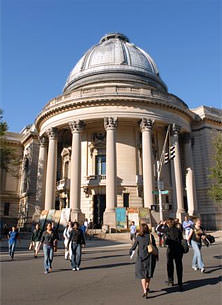 The Yale Council on African Studies was established in 1958, and was among the first such programs in the United States. Since then, Yale has built diverse art and archival collections with dedicated curators in the libraries and museums on campus. African literature, history, and anthropology are all taught at Yale, ranging from literature courses led by Ngugi wa Thiong’o in the 1990s to current courses in a number of different disciplines and languages, not least Christopher Miller’s francophone literature and theory courses, hugely popular with students. Yale offers a language program notable for its breadth and pedagogy, and has received international recognition as a resource center for outreach and language study.
The Yale Council on African Studies was established in 1958, and was among the first such programs in the United States. Since then, Yale has built diverse art and archival collections with dedicated curators in the libraries and museums on campus. African literature, history, and anthropology are all taught at Yale, ranging from literature courses led by Ngugi wa Thiong’o in the 1990s to current courses in a number of different disciplines and languages, not least Christopher Miller’s francophone literature and theory courses, hugely popular with students. Yale offers a language program notable for its breadth and pedagogy, and has received international recognition as a resource center for outreach and language study.
In 2013 the President of Yale, Peter Salovey, announced the Yale Africa Initiative and signaled that Yale’s engagement with Africa should form an important part of the university’s teaching, research and service. The Yale Africa Initiative includes partnerships with universities and companies on the continent, and the promotion of research collaborations, internships, and career opportunities. As part of the Initiative, since 2014, the University has hosted the Africa Salon, a festival of contemporary arts and culture.
The Salon hosts literary and performance events involving authors, publishers, and workshops, as well as film screenings, exhibitions, workshops, and debates including live links with organizations on the continent.
African literary and cultural studies are expanding in other ways at Yale. Since 2013, the annual Windham-Campbell Literature Prize has drawn international media attention to nine English-language writers per year, and the week-long festival that accompanies these literary prizes has stimulated considerable discussion of the terms by which authors are understood and studied. Since 2013, the Prize has been awarded to five African authors—Zoe Wicomb (2013), Aminatta Forna (2014), Teju Cole (2015), Ivan Vladislavic (2015), and Helon Habila (2015)—illustrating the proliferation of talent among authors from the continent.
